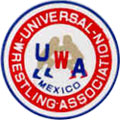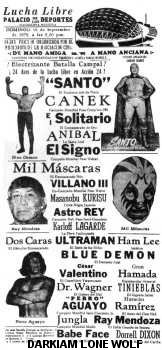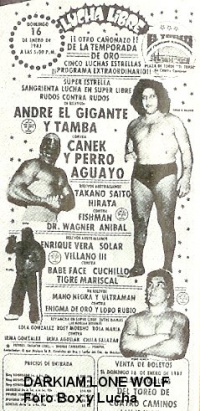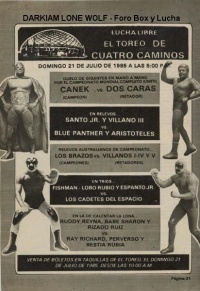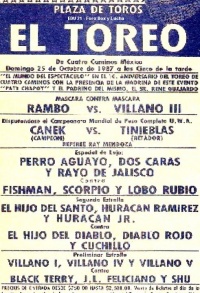LLI: Difference between revisions
No edit summary |
No edit summary |
||
| Line 11: | Line 11: | ||
The UWA championships continue to be defended and traded years after the promotion dissolved. While they continue the line of previously established champions, the UWA belts are now owned property of individual wrestlers or promoters. Some of the belts have been acquired by Japanese promotions to connect them with the lucha libre style. The Mexico-based belts are mostly vanity titles, existing so the owner can promote himself as a champion, with occasional feuds over the belt. | The UWA championships continue to be defended and traded years after the promotion dissolved. While they continue the line of previously established champions, the UWA belts are now owned property of individual wrestlers or promoters. Some of the belts have been acquired by Japanese promotions to connect them with the lucha libre style. The Mexico-based belts are mostly vanity titles, existing so the owner can promote himself as a champion, with occasional feuds over the belt. | ||
[[Image:V3 rambo 87.jpg| | [[Image:Uwa2.jpg|left|200px]] [[Image:Uwa3.jpg|center|200px]] [[Image:Uwa3.jpg|right|200px]] | ||
[[Image:Uwa1.jpg|left|200px]] [[Image:V3 rambo 87.jpg|right|200px]] | |||
{{UWATitleBox}} | {{UWATitleBox}} | ||
Revision as of 18:18, 29 May 2012
Lucha Libre Internaciónal (LLI) was a Mexican lucha libre promotion from 1975 to 1995. It's often remembered as Universal Wrestling Association, the name used as the governing body over the promotion's championship. The UWA and LLI names are basically interchangable; those in Mexico tend to use the LLI name (because the shows used those names) or remember it as "El Toreo" after the home arena. Those outside tend to use UWA (because they're more familiar with the championships.)
LLI started as a group of wrestlers and promoters splitting from EMLL. EMLL tried to completely control their wrestler's schedule, while LLI wrestlers were more independent and could make their own bookings. Their first show took place on January 29, 1975 at El Toreo De Naucalpan.
Canek, Villano III, Fishman, and Perro Aguayo were some of the stars of the promotion.
LLI had working agreements with New Japan Pro Wrestling and the World Wrestling Federation, and often brought in foreign talent to work short programs with their company stars. Many, like the Blue Blazer, were only really notable as a footnote when the wrestler involved achieved fame elsewhere, but a big part of the promotion was centered around nominally rudo Canek defending Mexican pride (and the UWA World Heavyweight Championship) against foreign scourges, including Hulk Hogan, Vader, and Andre the Giant.
LLI faded away in the early 90s. The old stars had been on top too long, and they were unable to create new ones. Talent left for CMLL, looking for better money and opportunity. When CMLL roster became too big, AAA was formed from a new splinter group and LLI fell far behind both promotions.
The UWA championships continue to be defended and traded years after the promotion dissolved. While they continue the line of previously established champions, the UWA belts are now owned property of individual wrestlers or promoters. Some of the belts have been acquired by Japanese promotions to connect them with the lucha libre style. The Mexico-based belts are mostly vanity titles, existing so the owner can promote himself as a champion, with occasional feuds over the belt.
| Universal Wrestling Association Championships |
|---|
| Official: Heavy (Dr. Wagner Jr.) |
| Outlaw: Light (Kato Kung Lee Jr.), Junior Light Heavy (Diluvio Negro II) |
| Now in Japan: Welter, Middle, Junior Heavy, Tag, Trios, |
| Defunct: Feather, Light Heavy, Women, International Women, Women Junior, Women's Tag, |
| Associated: WWF Light Heavy |
| This article is a stub of a yet to be completed article. Free to add your own details to this article |
|---|
